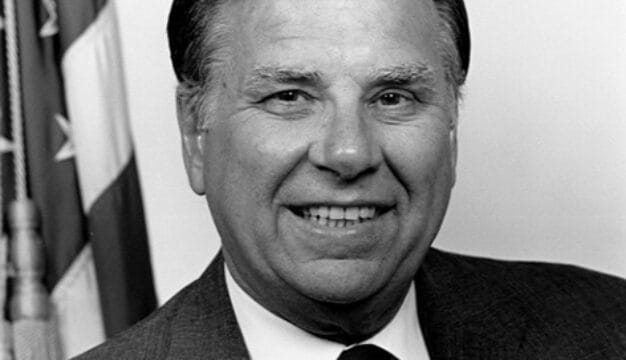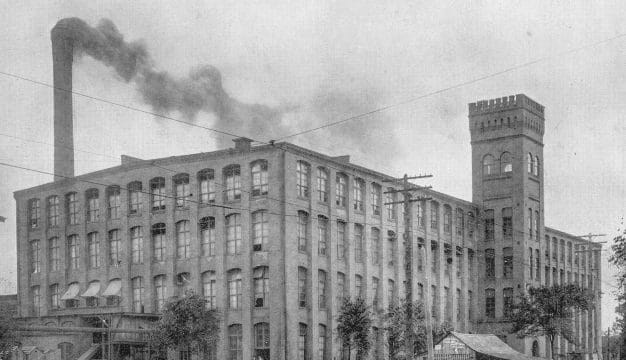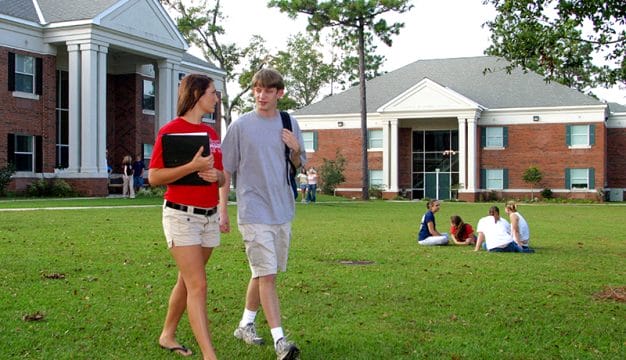Jabez Lamar Monroe Curry
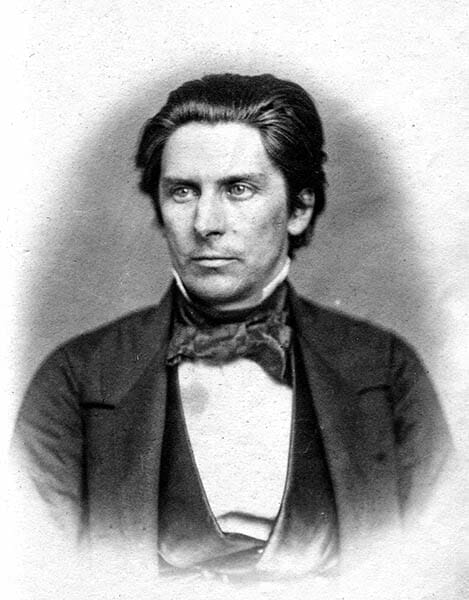 J. L. M. Curry
J. L. M. Curry (1825-1903) was an Alabama political leader who prior to the Civil War was a strong supporter of states’ rights and secession. After 1865, he became a zealous advocate of national unity and universal education. As an agent for various philanthropic education organizations, Curry worked to promote public school systems and industrial and vocation training for both blacks and whites. Thanks in part to his efforts, normal schools and grade schools sprang up throughout the South.
J. L. M. Curry
J. L. M. Curry (1825-1903) was an Alabama political leader who prior to the Civil War was a strong supporter of states’ rights and secession. After 1865, he became a zealous advocate of national unity and universal education. As an agent for various philanthropic education organizations, Curry worked to promote public school systems and industrial and vocation training for both blacks and whites. Thanks in part to his efforts, normal schools and grade schools sprang up throughout the South.
The son of planter William Curry, Jabez Lamar Monroe Curry was born on June 5, 1825, on his father’s plantation in Lincoln County, Georgia. The family moved to Kelley Springs, in Talladega County, Alabama, in 1837. Curry attended coeducational private academies and then Franklin College (now the University of Georgia), graduating in 1843 as one of the most distinguished students in his class. From September 1843 to February 1845, Curry attended the Dane Law School of Harvard University and graduated with an LL.B. degree. He then attempted to serve as a sergeant in the Mexican War (1846-48), but his regiment was not accepted. He continued to read law and was admitted to the bar. Curry practiced until 1850, when he lost interest in that career choice.
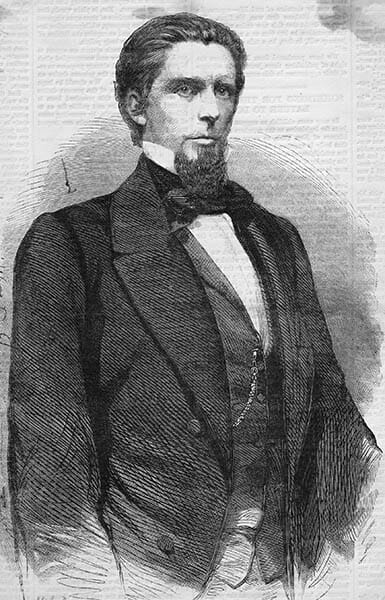 J. L. M. Curry, 1860
In 1847, he married Ann Bowie, whose family had moved to Alabama from Abbeville, South Carolina. That same year, he ran successfully for the Alabama House of Representatives and would serve there for a decade. Curry chaired the Committee on Internal Improvements, where he championed funding of the state’s roads and railroads and supported a bill to establish a public school system. In the early 1850s, Curry bought his brother’s plantation near Talladega and resumed his law practice. In 1857, Curry was elected to the U.S. House of Representatives, where he served until 1861 and sought to limit federal powers to those specifically named in the Constitution. He also worked to reduce the appropriations for many federal offices, opposed high tariffs, and defended slavery and the right of secession.
J. L. M. Curry, 1860
In 1847, he married Ann Bowie, whose family had moved to Alabama from Abbeville, South Carolina. That same year, he ran successfully for the Alabama House of Representatives and would serve there for a decade. Curry chaired the Committee on Internal Improvements, where he championed funding of the state’s roads and railroads and supported a bill to establish a public school system. In the early 1850s, Curry bought his brother’s plantation near Talladega and resumed his law practice. In 1857, Curry was elected to the U.S. House of Representatives, where he served until 1861 and sought to limit federal powers to those specifically named in the Constitution. He also worked to reduce the appropriations for many federal offices, opposed high tariffs, and defended slavery and the right of secession.
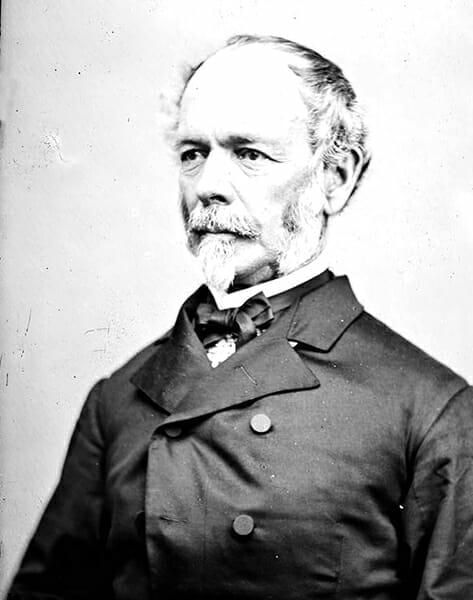 Joseph E. Johnston
Curry travelled to Maryland in December 1860 in an attempt to persuade state leaders to secede. He sat on the platform at the Alabama Secession Convention in January 1861 and after secession was elected to the Confederate Congress, where he championed tax restrictions and state autonomy and opposed the use of paper money. His largely anti-secession district defeated him for reelection, and his term expired February 18, 1864. A member of the Home Guards, he joined Gen. Joseph E. Johnston’s Army of Northern Virginia as it retreated from Richmond toward Atlanta, and in October 1864, he served as judge advocate in the military courts in Atlanta, after which he was appointed a lieutenant colonel and given command of the Fifth Alabama Regiment. His forces engaged in numerous skirmishes in Alabama until he left the army on April 17, 1865, after learning his wife had died. In October, he travelled to Washington, D.C., and was pardoned by the federal government for his participation in the Confederacy, although he was not allowed to run for political office until passage of a federal law in 1877.
Joseph E. Johnston
Curry travelled to Maryland in December 1860 in an attempt to persuade state leaders to secede. He sat on the platform at the Alabama Secession Convention in January 1861 and after secession was elected to the Confederate Congress, where he championed tax restrictions and state autonomy and opposed the use of paper money. His largely anti-secession district defeated him for reelection, and his term expired February 18, 1864. A member of the Home Guards, he joined Gen. Joseph E. Johnston’s Army of Northern Virginia as it retreated from Richmond toward Atlanta, and in October 1864, he served as judge advocate in the military courts in Atlanta, after which he was appointed a lieutenant colonel and given command of the Fifth Alabama Regiment. His forces engaged in numerous skirmishes in Alabama until he left the army on April 17, 1865, after learning his wife had died. In October, he travelled to Washington, D.C., and was pardoned by the federal government for his participation in the Confederacy, although he was not allowed to run for political office until passage of a federal law in 1877.
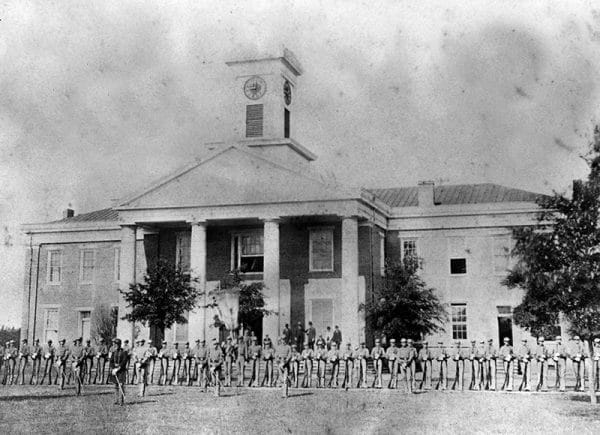 Howard College, 1858
Curry’s religious zeal had grown during the war, and he often addressed religious gatherings. In November 1865, he presided over the Alabama Baptist Convention and became president of Howard College (now Samford University) in Marion. He was ordained a Baptist minister in January 1866, and although he declined a number of pastorates, he gave more than 100 sermons during the year. In June 1867, he married Mary W. Thomas, daughter of a prominent Richmond businessman. Despairing of raising funds for Howard College and disheartened by the pro-Unionist control of the Alabama government, he accepted a professorship at Richmond College in 1868. During the 1870s and 1880s, Curry rebuffed numerous offers of positions from other prominent colleges and churches. In his capacity as a professor, Curry met and befriended many educational leaders of the recently established Peabody Education Fund, which was founded by philanthropist George Peabody to promote education among both blacks and whites in the former Confederacy. When its general agent, Barnas Sears, died in 1881, Curry was chosen to succeed him.
Howard College, 1858
Curry’s religious zeal had grown during the war, and he often addressed religious gatherings. In November 1865, he presided over the Alabama Baptist Convention and became president of Howard College (now Samford University) in Marion. He was ordained a Baptist minister in January 1866, and although he declined a number of pastorates, he gave more than 100 sermons during the year. In June 1867, he married Mary W. Thomas, daughter of a prominent Richmond businessman. Despairing of raising funds for Howard College and disheartened by the pro-Unionist control of the Alabama government, he accepted a professorship at Richmond College in 1868. During the 1870s and 1880s, Curry rebuffed numerous offers of positions from other prominent colleges and churches. In his capacity as a professor, Curry met and befriended many educational leaders of the recently established Peabody Education Fund, which was founded by philanthropist George Peabody to promote education among both blacks and whites in the former Confederacy. When its general agent, Barnas Sears, died in 1881, Curry was chosen to succeed him.
On behalf of the Peabody Fund, Curry worked tirelessly to establish public school systems, develop teacher education programs, and include African Americans in the educational system. He addressed numerous legislatures and other concerned bodies, traveling 17,000 miles in 1884 alone. In the fall of 1885, he was named as the U.S. representative to Spain as a political honor for his work and strove to promote free trade. In 1888, he resigned and resumed his role as agent for the Peabody Fund. In 1890, Curry also became the head of the Slater Fund, which worked to promote industrial education for African Americans and poor whites in the South. Former president Rutherford B. Hayes, a Harvard classmate, accompanied him on visits to southern schools in 1891. Curry realized public backing was essential for his work and strongly supported the Conference for Education in the South, which began in 1898. The organization played a role in the emergence in 1901 of the Southern Education Board, which worked effectively to promote universal public education in the South. The same year, Curry became its first supervising director. In 1902, Curry attended the meeting at which the General Education Board was created with an initial gift of $1 million from northern industrialist John D. Rockefeller.
Also in 1902, Curry served as a special envoy to Spain to celebrate the king’s coming of age ceremony, although his ill health required that he be accompanied by a nurse. He died February 12, 1903, in Asheville, N.C., at his brother-in-law’s home and was buried in Richmond. Predeceased in death by three children, he was survived by his wife and a son, Manly Bowie Curry. Curry received much posthumous acclaim. He was chosen by Alabama as one of two people to be represented in the U.S. Capitol’s National Statuary Hall until November 2009, when the statue was relocated to Samford University, and in 1905 the University of Virginia established the Curry Memorial School of Education after the Peabody Fund donated $100,000 in his honor.
Additional Resources
Alderman, Edwin Anderson, and Armistead Churchill Gordon. J. L. M. Curry, A Biography. 1911. Reprint, Whitefish, Mont.: Kessinger Publishing, 2006.
Chodes, John. Destroying the Republic: Jabez Curry and the Re-education of the Old South. New York: Algora, 2005.
Rice, Jessie Pearl. J. L. M. Curry: Southerner, Statesman, Educator. New York: King’s Crown Press, 1949.

